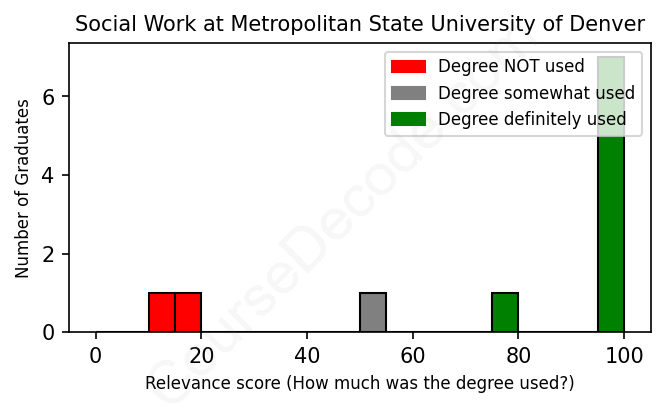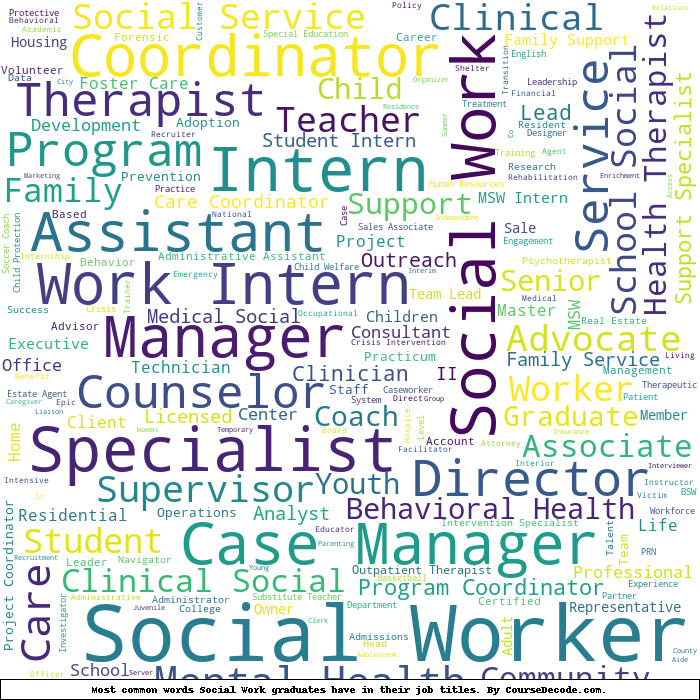
First, some facts. Of the Social Work graduates from Metropolitan State University of Denver we've analyzed , here's how many have used (or NOT used) their degree in their career:

These are estimates based on AI analysis of 11 LinkedIn profiles (see below).
The verdict? Significantly above average. Overall, with an average relevance score of 78%, Social Work graduates from Metropolitan State University of Denver have a much higher likelihood (+11%) of finding work in this field compared to the average graduate across all fields:
And for comparison, here's the chart for all profiles we've looked at across all degrees.
Also, after graduating, only 27% of these graduates have pursued further education other than another Bachelor's degree (such as a Masters degree or other), compared to the average across all profiles of 35%. This suggests a Bachelors degree is enough for most Social Work graduates, and it's normal to look for work straight after graduation.
See the details:
|
Relevance score: 100% We think this person has gone into a career highly relevant to their degree. We think this person has gone into a career highly relevant to their degree.
DEGREE INFOGraduated in 2022 from Metropolitan State University of Denver with a Bachelor of Applied Science - BASc in Social Work. No other secondary education since. JOB HISTORY SINCE GRADUATIONCaseworker Denver Human Services Jun 2022 - Mar 2023 Family Advocate  Foster Source Aug 2023 - May 2024 Caseworker  Adams County Government May 2024 - Present ABOUTNo information provided. |
The top 10 most common jobs done by the graduates we've analyzed (ranked most common to least) are:
After checking out the LinkedIn profiles of folks who studied Social Work at Metropolitan State University of Denver, it seems like a lot of them ended up in positions that really make use of their degree. The most common types of jobs they have are in mental health therapy and counseling. Many graduates work as Mental Health Therapists or Addictions Counselors, which totally align with their education because these roles demand a solid grasp of social work principles and therapeutic techniques. Others have found their way into roles as Social Workers or Caseworkers, where they get to support clients and families directly—a major aspect of what social work is all about.
However, it’s also interesting to note that not every job they took was directly related to social work. Some grads, like those who worked at Lockheed Martin, ended up in completely different fields that don't utilize their social work training at all. For them, it really seems like they may not be tapping into the full potential of their education. So overall, while many do find relevant and impactful careers in social work or related fields, some individuals drift away from that path, which can make for a pretty mixed bag in terms of career relevance. But hey, that's life, right? Sometimes your degree leads you in unexpected directions!
Here is a visual representation of the most common words in job titles for Social Work graduates (this is across all Social Work graduates we've analyzed, not just those who went to Metropolitan State University of Denver):

Graduates from the Social Work program at Metropolitan State University of Denver generally seem to find their footing in careers that are quite relevant to their field. Right out of school, many start off in roles like mental health therapists, counselors, or case managers. For instance, those who graduated in 2014 and 2017 moved quickly into mental health therapy roles, suggesting a strong immediate alignment with their degrees. Over the first few years, there's a clear trend of moving into more specialized or responsible roles, such as primary therapist or social worker, which indicates growth and a commitment to the profession.
If we look at the career paths over a span of 5 to 10 years, it appears that many graduates are still in the social work or mental health field, often moving up in their respective organizations or taking on roles that carry more responsibility. For instance, some have transitioned from being direct support providers to more strategic positions, like a director of social-emotional learning. However, there's a mixed picture for others; some ended up in roles that, while still helping people, veer away from traditional social work, like positions in tech or corporate settings. In summary, while many graduates seem to find fulfilling careers in social work, there's also evidence of a few straying into jobs less related to their degree, which might illustrate a broader trend of job-hopping or seeking diverse experiences in the workforce.
Getting a Bachelor’s degree in Social Work at Metropolitan State University of Denver is pretty challenging but totally doable if you’re committed. Social Work isn’t just about hitting the books; it involves a lot of hands-on learning, group projects, and understanding complex social issues. You’ll have to put in the time to study theories, ethics, and real-world applications, which can be a bit tough compared to some other majors. But if you’re passionate about helping people and engaging with the community, you might find it rewarding rather than overly difficult. Overall, it’s about average in terms of challenge, so if you’re willing to put in the effort, you’ll likely do just fine!
Most commonly, in the LinkedIn profiles we've looked at, it takes people 4 years to finish a Bachelor degree in Social Work.
So, looking at these grads from Metropolitan State University of Denver, it seems like they’re generally doing alright in their careers, especially considering the fields they’re in. Most of them started with entry-level jobs and gradually moved up, which is pretty common in social work and related areas. The pay can vary widely, but positions like “Mental Health Therapist” and “System Integration And Test Engineer” at Lockheed Martin typically offer decent salaries. However, some roles in social work, especially at the beginning, like the “Americorps Member” or “School Social Worker,” probably don't pay as much. Overall, while some might be struggling a bit initially, others look like they're on a solid career path where they can eventually make decent money, especially with experience.
Here is a visual representation of the most common words seen in the "about" section of LinkedIn profiles who have a Bachelor degree in Social Work (this is across all Social Work graduates we've analyzed, not just those who went to Metropolitan State University of Denver). This may or may not be useful:

Here are all colleges offering a Bachelor degree in Social Work (ordered by the average relevance score of their Social Work graduates, best to worst) where we have analyzed at least 10 of their graduates: